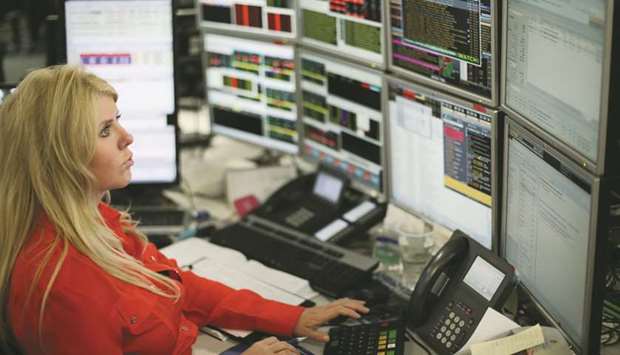World stock markets were slightly firmer yesterday, mostly posting modest gains after initial doubts on news that China’s economy grew at its weakest pace in nearly three decades as US President Donald Trump’s trade war hit home.
Wall Street opened little changed to weaker after its record-breaking run, with the market still counting on the US central bank to cut interest rates sooner rather than later despite recent strong jobs data.
Investors were also waiting to see earnings from JPMorgan Chase and the other banks, as well as other major companies such as Netflix, United Continental and Johnson & Johnson.
In Europe, London’s benchmark FTSE 100 index closed 0.34% higher at 7,531.72 and Frankfurt’s DAX 30 put on 0.52% 12,387.34 while the Paris CAC 40 edged up 0.10% to 5,578.21 points at the close yesterday.
“It was a day without much movement. The markets are really just waiting for a stronger lead on the macro-economic data front,” Yann Azuelos of Mirabaud France told AFP.
Asian equities initially stumbled but then staged a recovery as traders digested Chinese second-quarter gross domestic product (GDP) numbers.
China’s economy expanded 6.2% in the second quarter, the slowest headline reading since the early 1990s, official data showed.
The outcome was in line with forecasts and within the government’s target range.
“There’s no doubt in anyone’s mind that the trade war is a major contributing factor here,” noted Oanda analyst Craig Erlam.
Yet, despite the slowing GDP, other figures showed there were some bright spots in the Chinese economy, dealers said.
That handed a partial boost to the mining sector because China is a leading consumer of many raw materials.
Chinese industrial output in June rose 6.3%, from 5% in May.
Fixed-asset investment also picked up, rising 5.8% on-year in January-June, from 5.6% in January-May.
China’s 1.3bn consumers also continued to open their wallets, with retail sales growing 9.8% year-on-year in June, up from 8.6% in May.
“The Chinese data, while confirming slowdown fears, seems to be lifting basic resource stocks,” Erlam said.
“A decent rebound in industrial production is naturally driving this, easily exceeding expectations, and along with retail sales and investment figures, arguably indicates that worst fears are not being realised.”
The GDP number nevertheless highlights the negative impact the US tariffs stand-off is having on China, as leaders also try to recalibrate its growth model from exports and state investment to one driven by consumer spending.
Observers pointed out that the weakness raised the chances of further monetary easing measures from the central People’s Bank of China, with investors also tracking the progress of the latest trade talks between Washington and Beijing.
Amid concerns about the possible impact, some expect the US Federal Reserve will cut borrowing costs at the end of the month, though there is speculation about how far it will go.
While bank boss Jerome Powell’s congressional testimony last week flagged a reduction, data indicating inflation remains reasonably healthy has kept investors guessing.
“The Fed is under pressure to cut the interest rate this year,” noted ThinkMarkets analyst Naeem Aslam.
Meanwhile, the British pound fell back towards six-month lows against the dollar and the euro yesterday, with traders still nervous about a loss of momentum in the UK economy, the prospect of an interest rate cut and a new prime minister.
At the end of last week, sterling ended a nine-week losing streak against the euro and inched up from a low of $1.2439 hit at the end of June.
However, analysts are largely bearish on the pound after a run of poor economic data and signals from the bank of England that its next move may be to cut interest rates rather than raise them, as it had previously flagged.
The pound fell 0.5% to $1.2510, while against the euro it declined 0.5% to around 90 pence.
Sterling had hit a six-month low of 90.10 pence per euro last week.
On Tuesday, employment and wage growth data for the month of May will show how the British labour market is holding up. Many economists expect the UK economy will have contracted in the second quarter.
Investors are also waiting for the outcome of the Conservative party leadership contest to replace Prime Minister Theresa May.
Eurosceptic Boris Johnson is the favourite to win against Jeremy Hunt in a vote by Conservative party members. The winner will be crowned leader – and prime minister – by the end of July.
Nomura FX strategist Jordan Rochester said the bank’s analysts had concluded that sterling was “in the value zone for now, vols are cheap and a lot of bad news is priced in, but that’s just for the next six weeks or so”.

A trader monitors share prices at the London Stock Exchange. The FTSE 100 closed 0.34% higher at 7,531.72 points yesterday.
